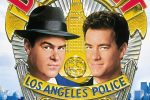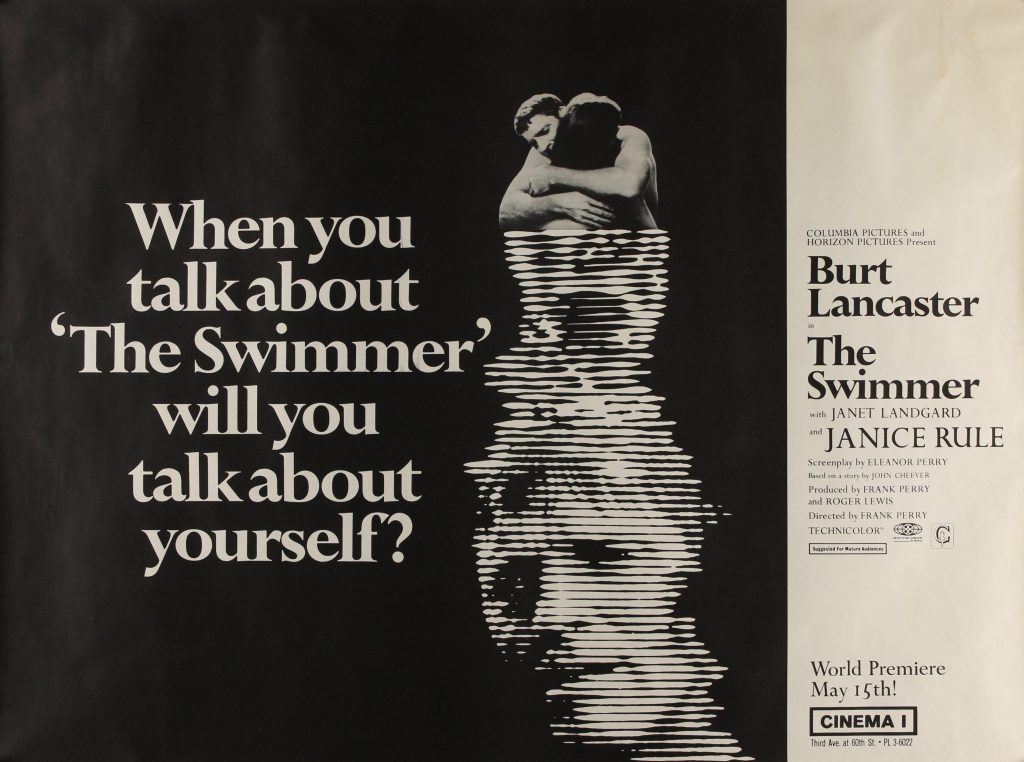The red-band trailer for the upcoming CHIPS movie contains no fewer than five f-bombs, two discussions on the hygiene of a particular act between people who love each other very (very) much, and one incident of homophobic hijinks as a man’s face bumps into another man’s business and they discuss just which part of his face made contact. This movie, it should be noted, is an adaptation of a TV show in which the heroes never actually drew their guns and that also unsuccessfully spun-off a pilot about a secret karate unit of the LAPD featuring a leader with an eyepatch, a lone Asian cast member and a white guy who speaks primarily through a racist Fu Manchu puppet, complete with horrifying accent.
Point is, the CHIPS movie, even in the advertising, doesn’t bear much resemblance to its source material beyond the general existence of the California Highway Patrol.
It’s a closer relative, however, to a certain kind of adaptation – the parodic homage. CHIPS fits right in with the likes of 2004’s Starsky & Hutch, 2005’s The Dukes of Hazzard, and 2012’s 21 Jump Street and its sequel. While the mileage varies drastically among the class, these movies follow the same formula: take the concept of the adapted series, establish a self-aware (or, sometimes, self-conscious) distance, and exaggerate the source material’s quirks as needed. Insert cameos of the original players if they care/need the money. Rinse, repeat, reboot.
Starsky’s unconditional love for his car is turned into an obsessive punchline. The new Duke boys would make more sense in Of Mice and Men than Hazzard County. 21 Jump Street may as well be an unrelated comedy.
The mechanism works, at least in a financial sense, and shows no signs of rusting. Catch The Rock in Baywatch, only in theaters, May 26.
So where did it come from? The pair of Brady Bunch movies in the mid-1990s certainly set the stage, especially in how they commented on the show’s inescapable wood-panel-and-polyester vintage.
 But it was 1987’s Dragnet that laid the prescient groundwork and, for the most part, went unnoticed for it.
But it was 1987’s Dragnet that laid the prescient groundwork and, for the most part, went unnoticed for it.
By the mid-1980s, Dragnet was a kitschy relic only a few capes away from Adam West’s Batman. The stiff-armed, stiff-suited cops closing cases with only a machine-gun-rattle of questions and an unending stream of witnesses were relegated to reruns, overshadowed by Hill Street Blues and moody driving montages set to Phil Collins. As the Chicago Tribune put it, “Dragnet is already its own best parody.”
But despite the competition, it was the success of those reruns, mostly of the late-’60s series, that convinced Universal to consider bringing Dragnet to the big screen.
It was just dumb luck that one of the most bankable comedy talents of the decade happened to be a lifelong Dragnet devotee and dead-on mimic of series creator and Joe Friday himself, Jack Webb.
Dan Aykroyd agreed not only to star, but pen the script as well. Joining him would be a fellow veteran of Saturday Night Live’s sex-drugs-and-sketch-comedy early years, writer Alan Zweibel. The resulting movie, with input from first-time director and long-time screenwriter Tom Mankiewicz, plays like a breezy masterclass in parodic homage.
Dragnet opens like so many episodes before it, with the city and the sergeant: “465 square miles of constantly interfacing humanity.” Sunburnt glimpses of Los Angeles kept in line by the cold, verbose romance of Joe Friday’s voice-over. It ends as it should. “I work here. I carry a badge.” Then the thunderous horns of that infamous theme, a sound that can only mean justice is on its way in a J.C. Penney suit. The first sign it’s not an update played straight comes with the traditional close-up of Friday’s badge, number 714, a processed shot of the title and an insidiously catchy bass line, courtesy of Art of Noise. The band’s cover of the Dragnet theme manages to combine the palm-tree-and-sunset synth of Miami Vice, playful big band swells of the original, and even samples of dialogue yet to come, record-scratched to the brink of incoherence (it takes a full seven seconds to get past the first syllable of Aykroyd’s “Just the facts, ma’am”). The opening three minutes of the movie work as a mission statement in miniature – play it deadly straight until it’s time to get silly, but never smile too wide.
The first half of Dragnet hardly plays like a parody at all. Show conventions, like the promise that it’s a true story or Friday’s constant reminder of time and place, are confidently embraced. Harry Morgan reprises his role as Bill Gannon from the late-’60s run of the show, a sly callback that predates similar appearances in The Brady Bunch, Starsky & Hutch and, most famously, 21 Jump Street. Although Aykroyd’s character is named Joe Friday, he’s actually the original’s nephew. And he’s in need of a new partner. Cue the comically mismatched, modern, womanizing, smart-ass Pep Streebeck, played with typecast perfection by Tom Hanks.
Although the sacred rules of buddy-copdom state the two should spend an hour of the movie clashing on the job, Dragnet puts them to work immediately. The breakneck (and cost-saving) pace of the series shines through in Dragnet’s first half, keeping the increasingly bizarre case hurtling along. Joe and Pep get their jabs in, but it never gets in the way of them, you know, being cops. The “reluctant friendship” scenes come in the second half, when the story cleverly turns its attention (and voice-over) to Streebeck, the Dragnet pace giving way to an episode of Magnum, P.I. where Tom Selleck must save Higgins from a goat-centric cult.
Which, it should be made clear, is the actual, honest-to-God plot of Dragnet. A gang of ne’er-do-wells that knows how to use the machines at Kinko’s has been stealing animals, burning warehouses of Playboy rip-offs, and leaving their business cards at every scene. Aside from some jokes about a mohawked lion and a very special kind of repairman, the movie treats the investigation as soberly as the series would’ve. Only after it lays that groundwork and pays sufficient homage does it ease up, right around the time Joe and Pep wrestle a 30-foot python underwater. It’s a pretty even split between Dragnet and Beverly Hills Cop, down to a PG-13-pushing scene in a strip club that happens to have the best coffee in town. But rest assured – Dan Aykroyd plays Friday all the way down the line, never once flinching, breaking the illusion.
 It’s no minor miracle that the rest of the cast don’t break it either. Christopher Plummer as the awkwardly boyish televangelist and Dabney Coleman as the lisping king of skin mags are clearly having a ball, but never at the expense of the movie. They feel like the guest stars in a very expensive pilot for Dragnet ’87, which also happens to have been the film’s working title. Alexandra Paul isn’t given much to do, but goes toe-to-toe with everyone she’s put up against. The chemistry between the leads is infectious, but in the end the movie’s greatest asset is Aykroyd. To call it an impression is selling it short. His embodiment of Jack Webb is the movie’s greatest special effect. Whether he’s rattling off entire paragraphs to threaten a perp, discovering love for the first time or deftly holding off three muggers while also teaching them the dangers of smoking, Aykroyd alone is enough to make Dragnet worthwhile.
It’s no minor miracle that the rest of the cast don’t break it either. Christopher Plummer as the awkwardly boyish televangelist and Dabney Coleman as the lisping king of skin mags are clearly having a ball, but never at the expense of the movie. They feel like the guest stars in a very expensive pilot for Dragnet ’87, which also happens to have been the film’s working title. Alexandra Paul isn’t given much to do, but goes toe-to-toe with everyone she’s put up against. The chemistry between the leads is infectious, but in the end the movie’s greatest asset is Aykroyd. To call it an impression is selling it short. His embodiment of Jack Webb is the movie’s greatest special effect. Whether he’s rattling off entire paragraphs to threaten a perp, discovering love for the first time or deftly holding off three muggers while also teaching them the dangers of smoking, Aykroyd alone is enough to make Dragnet worthwhile.
But that would be selling everything else tragically short. Dragnet managed to bring its aging source material up-to-date, hold onto what made it special and tell a goofier story than Jack Webb would’ve ever imagined. Unburdened by endless improv, it blazes along at a pace almost unheard of in modern comedies. It works for fans of the original and the uninitiated alike. A more overqualified cast would be hard to find. The soundtrack, while overshadowed by the internet-infamous “City of Crime” rap with Dan Aykroyd and Tom Hanks, is unfiltered ’80s excellence, complete with perhaps the peppiest Patti LaBelle song of the decade.
Dragnet laid the groundwork for a whole genre of adaptation, and did it more faithfully, more respectfully and more cleverly than most of its offspring. It deserves better than its basic-cable sentence.
But that’s subjective. The rest is just the facts.
Jeremy Herbert cleans up the streets in Cleveland.



